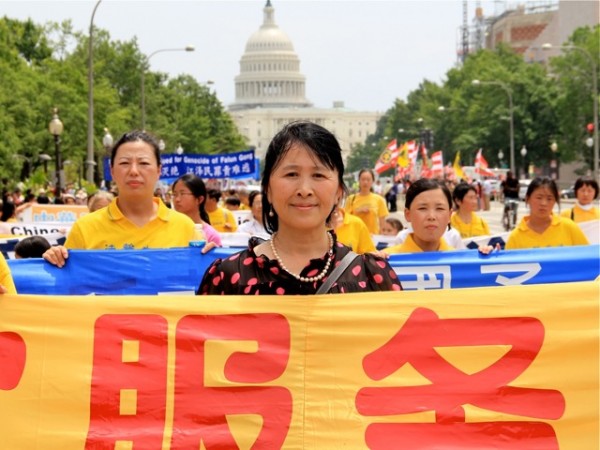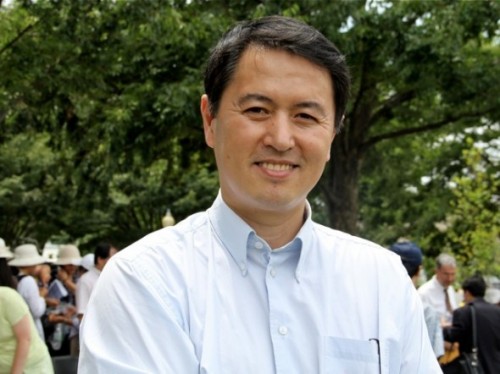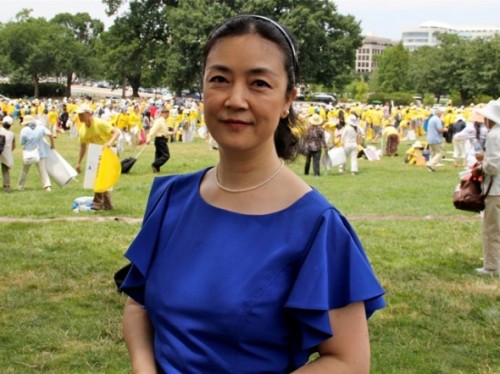
Falun Gong Rally Highlights Change Coming to China
By Shar Adams, The Epoch Times, July 17, 2012
WASHINGTON—Significant cracks are starting to appear in the Chinese regime’s hold on power, according to China analysts and human rights activists attending a rally on Capitol Hill, Thursday July 12.
“China is on the verge of major social changes,” says Chinese born American, Erping Zhang, speaking at a rally to mark 13 years of persecution of Falun Gong practitioners in China. “A lot of people feel this year may be the end of the communists because the ideology of communism seems to be on the brink of bankruptcy.”
Zhang, who is a spokesperson for the New York Falun Dafa Association, holds degrees from the Beijing International Studies University and from the John F. Kennedy School of Government at Harvard University where he’s also an Edward Mason Fellow. He maintains an extensive network of friends in China and is a specialist in Chinese censorship of the internet.

He says corruption and human rights abuses have become so rampant on the mainland that it now goes well beyond the persecution of Falun Gong or the Tiananmen Square massacre to impact ordinary people. Disaffection with the Chinese Communist Party (CCP) is so widespread, it is evident on the internet, chat rooms and even openly on the streets.
China now experiences on average 500 protests a day, Niu Wenyuan, a member of the National Chinese People’s Political Consultative Committee was reported as saying in New Express Daily in February.
Increasing income disparity in China has helped make the situation more combustible, with social and economic indicators of potential change reaching critical proportions, said Zhang. He listed key data: 0.05 percent of the population owns 60 percent of the total wealth; the average income ranks 90th in the world; China’s healthcare ranks 166th in the world.
“When the state owns such large currency reserves and yet the population enjoys so little, some people call this ‘strong state weak individuals,’” Zhang said. “This causes huge concerns for the general public.”
Even Chinese officials are rushing to move their money offshore, buying luxury houses in Australia, Canada, and the United States and sending their children overseas to study, he said.
Persecution
One barometer of change in China involves attitudes toward the spiritual practice of Falun Gong. Out of fear of Falun Gong’s popularity and the attractiveness of its teaching to the Chinese people, the Chinese regime launched a campaign to “eradicate” Falun Gong in July, 1999.
Jennifer Zeng, a subject of Free China, an award-winning documentary about the persecution of Falun Gong in China, was also at the rally. Zeng is one of the victims of the persecution.

After spending two years in a labor camp for practicing Falun Gong, Zeng fled China and obtained asylum in Australia, where she wrote a best-selling book, Witness to History, about her horrific experience.
“It is always wonderful to see so many Congressmen so many people from other organizations stand up,” Zeng said referring to the many members of Congress and NGO’s that had sent letters or spoke at the event.
She noted that this year the U.S. Human Rights Report on China had mentioned organ harvesting from Falun Gong practitioners as a concern. One of the truly horrific acts perpetrated by the communist regime on the peaceful group, the acknowledgement is part of a change in understanding about China both within the mainland and outside, Zeng said.
“I think the climate is different—although we don’t see much change on the surface, deep down I think things are changing,” she said.
Tide is Turning
After 13 years of state propaganda against Falun Gong, Chinese people are starting to see that the Chinese regime has lied about the practice, Zhang said, with public solidarity evident in demonstrations around the country in support of Falun Gong practitioners.
“This has never happened before,” Zhang said, “It is a sign the CCP’s propaganda failed to convince people that Falun Gong is bad.”
In one case, in April this year, over 300 village households in Zhouguantun, Hebei Province petitioned Communist Party officials, demanding the release of Falun Gong practitioner Wang Xiaodong, a teacher in their community who had been arrested because of his practice. They signed with their real names and many included their thumb prints.
Zhang believes Chinese people now see the suppression of Falun Gong practitioners as a reflection of their own suppression.
“They feel the urgency to defend Falun Gong because they feel that in defending the rights of Falun Gong they are defending the rights of themselves,” he said.
Alan Adler, spokesperson for the support group, Friends of Falun Gong, made the link between the attempted defection of senior Chinese policeman Wang Lijun to the U.S. Embassy earlier in the year and the ensuing fall from power of his boss and senior cadre, Bo Xilai.
Both officials have been linked to organ harvesting of Falun Gong practitioners. Bo’s expected ascent to power was sidetracked in 2007 by the number of lawsuits against him around the world for his role in the persecution of Falun Gong.
The persecution against Falun Gong represents “a horrible, horrible setback for the Chinese people,” Adler said, “They deserve better.”
For China to really move forward, it will have to hold those perpetrators accountable and “redress what has happened,” he said. “The only way to get that done is by the Chinese people themselves.”
